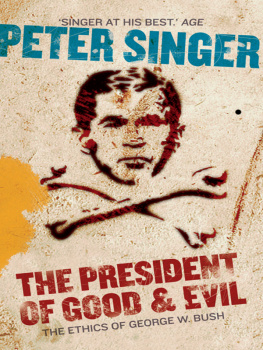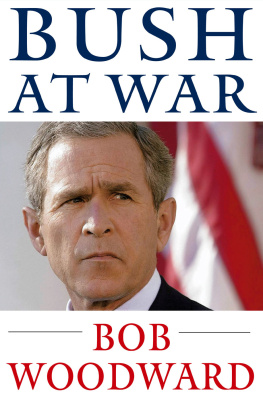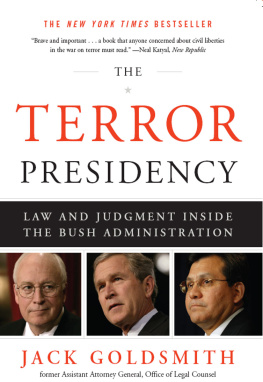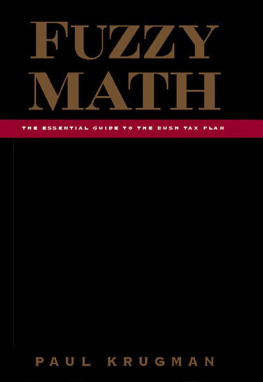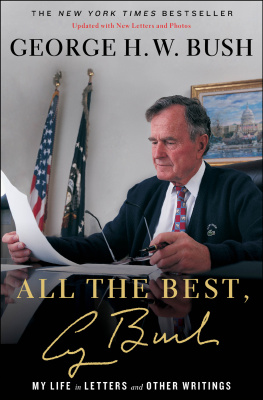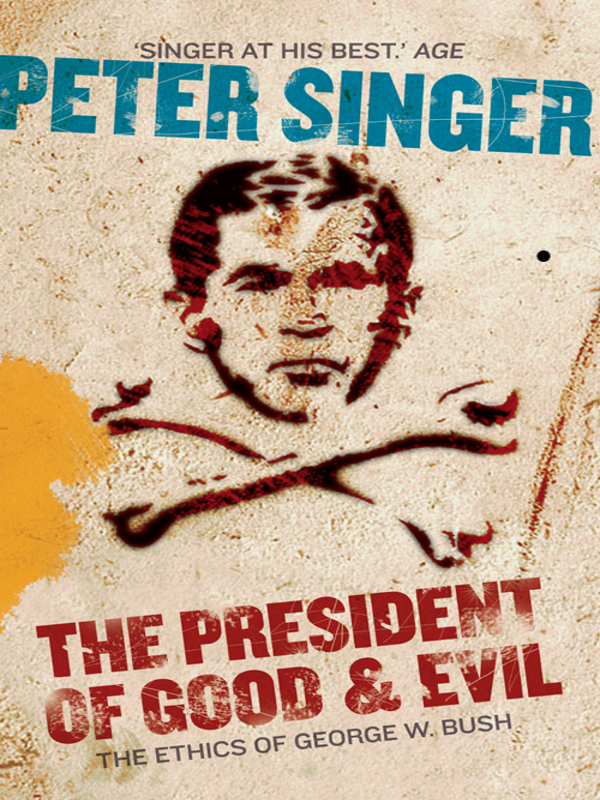
THE PRESIDENT OF GOOD AND EVIL
Peter Singer was born in Melbourne in 1946, and educated at the University of Melbourne and the University of Oxford. He has been Ira W. DeCamp Professor of Bioethics in the University Center for Human Values at Princeton University since 1999, a position that since 2005 he has combined with an appointment as Laureate Professor at the University of Melbourne, attached to the Centre for Applied Philosophy and Public Ethics.
An internationally renowned philosopher and acclaimed author, in 2005 Peter Singer was named by Time magazine as one of the worlds 100 most influential people. His latest book, The Ethics of WhatWe Eat, co-authored with Jim Mason, was released in 2006.
OTHER BOOKS BY THE AUTHOR
Animal Liberation
Democracy and Disobedience
Practical Ethics
The Expanding Circle
Marx
Hegel
Animal Factories
(with Jim Mason)
The Reproduction Revolution
(with Deane Wells)
Should the Baby Live?
(with Helga Kuhse)
How Are We to Live?
Rethinking Life and Death
The Greens (with Bob Brown)
Ethics into Action: Henry Spira and the Animal Rights Movement
A Darwinian Left
Writings on an Ethical Life
Unsanctifying Human Life
One World
Pushing Time Away
The Ethics of What We Eat
(with Jim Mason)
PETER SINGER
THE PRESIDENT
OF GOOD AND EVIL
THE ETHICS OF GEORGE W. BUSH

The Text Publishing Company
Swann House
22 William Street
Melbourne Victoria 3000
Australia
www.textpublishing.com.au
Copyright Peter Singer 2004, 2007
All rights reserved. Without limiting the rights under copyright above, no part of this publication shall be reproduced, stored in or introduced into a retrieval system, or transmitted in any form or by any means (electronic, mechanical, photocopying, recording or otherwise), without the prior permission of both the copyright owner and the publisher of this book.
First published in the USA by Dutton, 2004
First published in Australia by The Text Publishing Company, 2004
This edition, 2007
Designed by Chong Weng-ho
Typeset by J & M Typesetting
Printed and bound by Griffin Press
National Library of Australia
Cataloguing-in-Publication data:
Singer, Peter, 1946- .
The president of good and evil : the ethics of George W. Bush.
Bibliography.
ISBN 978 1 921351 18 1
1. Bush, George W. (George Walker), 1946- - Ethics. 2. United States - Politics and government - 2001- . I.Title.
973.931092
CONTENTS
When I began work on this book, George W. Bush was at the height of his popularity. In March 2003, when he ordered US forces to attack Iraq, over 70 per cent of Americans approved of the way he was doing his job. His Republican Party supporters controlled both houses of Congress, and the mainstream media treated him with such respect that, as noted in the pages that follow, they did not report some extraordinary gaffes that should have cast doubt on his grasp of the issues he was dealing with as president.
Now the tide has turned. In this, the incompetence with which the Bush administration responded to the disaster of Hurricane Katrina played a role. Michael Brown, director of the Federal Emergency Management Agency, had had no emergency management experience before joining FEMA in 2001in fact his previous job was as commissioner of the International Arabian Horse Association, and he had resigned from that position under pressure, leaving the organisation virtually bankrupt. But he was a Republican, and had been a close friend of Bushs campaign manager. Amidst stinging criticism of the way in which he was handling the rescue of New Orleans, he was forced to resign. Then it emerged that the Bush administration, focusing on big tax cuts that went mostly to the wealthy, had slashed by more than 80 per cent funding requested by the New Orleans district of the US Army Corps of Engineers for building levees.
Disillusion over the Iraq war, however, has been the biggest factor in undermining support for the president. The moral failings of Bushs policy, noted in this book, have combined with the realities facing US forces on the ground to erode confidence in what Bush says and what he does. The farce of the premature mission accomplished celebrations, the failure to find weapons of mass destruction, the revelations about how intelligence was massaged and misrepresented to build the case for war, the lack of any clear indication of when, or how, the war will come to an end, and the steadily rising toll of US soldiersnow surpassing the number of people killed in the terrorist attacks of September 11 2001have finally sunk in. (The vastly larger toll of Iraqi civilians killed may also be having some impact, although in the US it still receives relatively little media attention.)
Many of the most vocal advocates of the policies followed by the Bush administration, have now resigned or been forced out of office, including Secretary of Defense Donald Rumsfeld, his deputy Paul Wolfowitz (who has since also had to resign from his next job, as President of the World Bank), John Bolton (who held a brief, abrasive, and notably unsuccessful appointment as US ambassador to the United Nations), and Bushs closest political adviser, Karl Rove. Vice-President Dick Cheney remains, but he has lost his own chief of staff, I. Lewis Libby. Libby was saved from serving two and a half years in prison by Bushs commutation of the sentence he received after being convicted of lying to FBI agents and grand jurors investigating the unmasking of Valerie Plame. Plame was a CIA operative and the wife of Joseph Wilson who, as described below, discredited the administrations claim that Saddam Hussein had been trying to buy uranium from Niger. That commutation was a flagrant case of doing favours to friends that made nonsense of the Bush administrations highly public tough stance on the need for long prison sentences to deter crime.
Bushs approval ratings have fallen below 30 per cent, making him the most unpopular president since Richard Nixon. The Democrats have a majority in both houses of Congress. Three-quarters of Americans disapprove of the way Bush is handling the situation in Iraq. Even many Republicans agree that going to war in Iraq was a mistake, though some want to stay until victory is achieved, and others think it is time to get out.
Not only Bushs approval, but also that of the United States, has plummeted during his administration. The 2007 Pew Global Attitudes Project shows approval of the US is down to single digits in Turkey, long an American ally, and is only 30 per cent in Germany. Of particular concern for the war against terror is the abysmally low US image in most Muslim countries. In Afghanistan, Iraq, Lebanon and the Palestinian territoriesall places where the US, under Bush, has attempted to intervene, militarily or politically, in favour of democracycivil strife, rather than democracy, prevails. The Bush policy of American preeminence and a Pax Americana is in tatters.
For all the terrible consequences of the war in Iraq, when scholars debate the history of the Bush presidency in the mid-twenty-first century, they may well see his deepest moral failing as his complacent and fundamentally selfish attitude to climate change. Under Bush, seven years have been wasted. That is time that the world could not spare, if it was to forestall the worst effects of climate change. The delay may cause rains to fail in areas of land that now feed hundreds of millions of people and cause rising sea levels to render tens of millions of people homeless.
Next page
